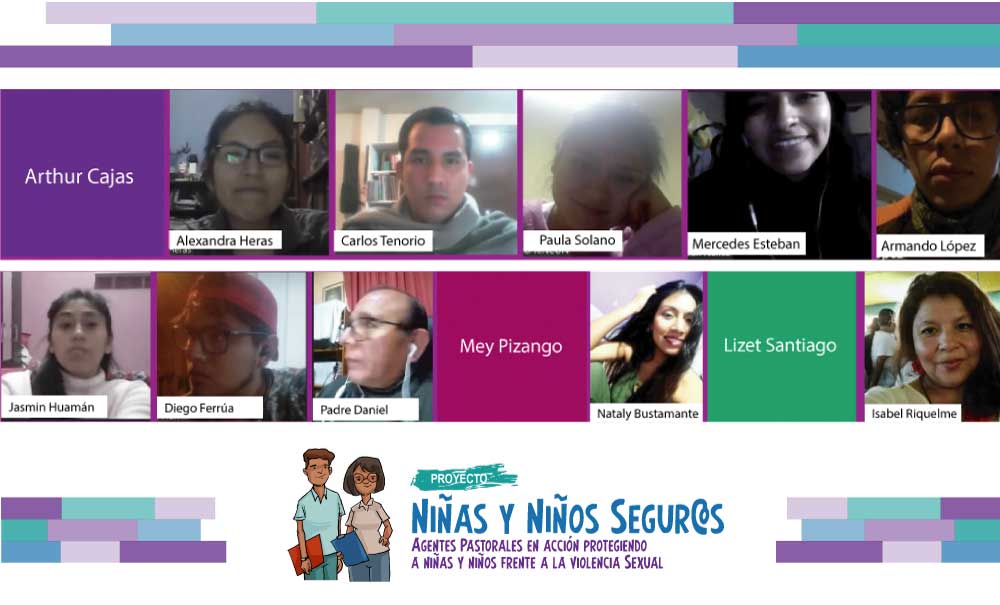Safe Children Project in Huaycán, is reaffirmed as a commitment that unites San Andrés parish pastoral agents in their voluntary work for a safe and dignified childhood.
Since the State of Emergency began in the country, every day Jazmín Huamán (23) and Diego Ferrúa (25) have been preparing intensively in their work as catechists of children and adolescents in the San Andrés de Huaycán parish now with new challenges where remote monitoring due to COVID-19 becomes a constant practice. At the same time, they are trying to get temporary jobs to face the economic ravages of the pandemic and support their families.
However, their purpose of serving others transcends their work in the church. Along with them, another 8 young people are active participants in the project “Safe children: pastoral agents in action protecting girls and boys against sexual violence”, a project that began days before the new coronavirus appeared in Peru. This project receives funding from the Italian Episcopal Conference and is promoted by ASPEm, in collaboration with the San Andrés de Huaycán Parish. In the months of June and July, the young people participated in a training program in order to strengthen the personal protective factors of children and adolescents, against maltreatment and sexual abuse, for which they received a series of trainings virtual information on how to face the different challenges as a result of COVID-19, such as the national state of emergency, social isolation during quarantine, the Ethical Conduct Code for the protection of children and adolescents of the Chosica Diocese, latent situations of scenes of family violence and sexual violence, and at the same time exercise a facilitating role in their community, either as socio-educational animators of children and adolescents or as radio promoters.
“I have learned to recognize the types of violence, to find its signs and it has made me discover some concepts that I did not know. Culturally, in Huaycán, violence and sexism have become normalized. It is common to hit a child when they make a mistake. Normalization means that these acts continue to be recurrent and passed on from parents to daughters and sons and between sisters and brothers. We must recognize that violence is something real, but that we are in time for more young people like us to begin to change their mentality and not allow or encourage these acts” says Diego Ferrúa, a participant in the project. And it is that according to UNICEF, in the first fortnight of social isolation, line 100 of the Ministry of Women and Vulnerable Populations (MIMP) received about 2,800 calls denouncing violence in the home. The MIMP statistics also indicate that 643 children or adolescents have used line 100 to request information, guidance and to warn of an act of violence against their mother or against themselves. Likewise, in this period of confinement at home (March to May 2020), there is a worrying record of 226 rapes. Almost 60% (135) of the victims are minors (boys, girls or adolescents).
In Huaycán, situations of violence are exacerbated, especially in the highlands due to the fact that many families live in overcrowding. “In Huaycán, many people suffer unfortunate experiences of violence, but it is not usually communicated or denounced. I would like children and adolescents to know how to take care of themselves, that they can make their opinion prevail. I will put into practice everything I have learned during these months. Now I have understood the importance of these issues and to develop empathy, encouraging and encouraging them and trying to motivate them in these difficult times for all of them” says Jazmín Huamán, a participant in the project.
The involvement of these young people in their training process will allow what they have learned to generate a multiplier effect on the people of their community, contributing to the reduction of risk factors for violence against children and adolescents.
About the project:
The Safe Children project aims to contribute to the improvement of the protection of the community and prevention system to face sexual violence that affects girls, boys and adolescents, reducing their risk factors. To do this, the project capitalizes on the actions of pastoral agents, as trainers and facilitators for a safe and dignified childhood. Among the planned actions, the adaptation of differentiated environments for boys, girls and adolescents in homes stands out; training and awareness-raising processes on violence and its effects for different community actors, such as parents, pastoral agents, girls, boys and adolescents. Likewise, the project plans to develop a socio-educational animation program, through the Storytelling technique, where the pastoral agents involved will develop accompaniment sessions for the introduction of topics on the care and prevention actions that children and adolescents should have if they find themselves in a possible situation of violence. In addition, a radio sequence will also be implemented, which will be directed by the pastoral youth through Radio Enmanuel de Huaycán, in order to dialogue and sensitize the population about this problem.


Leave a Reply